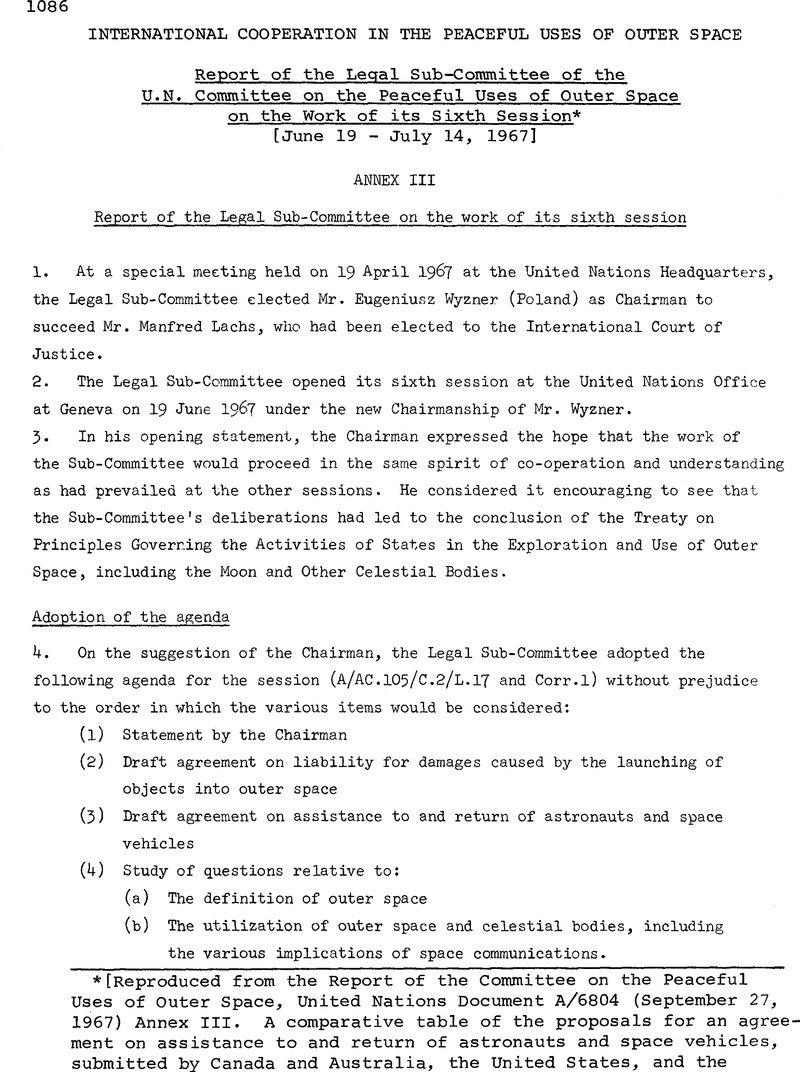Article contents
International Cooperation in the Peaceful Uses of Outer Space Report of the Legal Sub-Committee of the U.N. Committee on the Peaceful Uses of Outer Space on the Work of its Sixth Session*
Published online by Cambridge University Press: 20 March 2017
Abstract

- Type
- Reports
- Information
- Copyright
- Copyright © American Society of International Law 1967
Footnotes
[Reproduced from the Report of the Committee on the Peaceful Uses of Outer Space, United Nations Document A/6804 (September 27, 1967) Annex III. A comparative table of the proposals for an agreement on assistance to and return of astronauts and space vehicles, submitted by Canada and Australia, the United States, and the U.S.S.R., appears at page 1094. A comparative table of the proposals for an agreement on liability for damage caused by the launching of objects into outer space, submitted by Belgium, Hungary, and the United States, appears at page 1103. Except for the two comparative tables, the Appendixes to Annex III have not been reproduced.
[The Committee on the Peaceful Uses of Outer Space at its 49th meeting on September 13, 1967, took note of the report of the Legal Sub-Committee, expressed the hope that the Sub-Committee would be able to make more progress, and recommended that the Legal Sub-Committee meet again early in 1968.]
References
a/ For foot-note, see next page.
a/ The possibility of including “or by mistake”, after the word “emergency”, has been deferred for further consideration.
b/ (i) The question whether the expression “launching State” or some other expression, as for example “State of Registry” or “State which announced the launching” should be used has been deferred for further consideration.
(ii) No agreement was reached on the question of the inclusion of the word “or international organizations” In this provision. This question was deferred for further consideration.
c/ The possibility of including “or by mistake”, after the word “emergency” has been deferred for further consideration.
d/ The question whether the expression “launching State” or some other expression, as for example “State of Registry” or “State which announced the launching”, should be used has been deferred for further consideration. The question whether the expression to be used should also Include international organizations has been deferred likewise.
e/ No agreement was reached on the Inclusion of indirect damage and delayed damage in the definition.
f/ The question whether the State referred to in (2) and (3) above should be liable primarily, or only secondarily (if the State referred to in (l) above cannot be identified) was left for further consideration.
g/ No agreement was reached on whether the Convention should apply to damages sustained by: (a) Persons who are permanent residents but not nationals of the applicant (presenting) State;(b) A spacecraft and its personnel during launching, transit or descent.
h/ No agreement was reached whether the launching (respondent) State should, on proof of fault, be liable to pay compensation for damage caused to space objects which have left the surface of the Earth.
i/ For foot-note, see next page.
i/ No agreement was reached on the question whether the liability of the States members of the international organization that are parties to the liability convention:(a) Should be residual and arise only in the event of default by the international organization, or(b) Should arise at the same time as the liability of the international organization. Nor was agreement reached on the question of the rights of international organizations under the Convention. This problem requires further consideration.
* The Belgian delegation reserves the right to submit an amendment dealing with the principle enunciated in this article.
- 1
- Cited by




